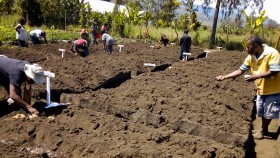Australia has a critical role in tackling climate change
The world has every chance to cut emissions deeply and Australia is critical to the global effort, say leading authors from The Australian National University (ANU) of the latest Intergovernmental Panel on Climate Change (IPCC) assessment report on climate change mitigation.
The report, which is the world's definitive stocktake on climate change action, makes clear that action to reduce greenhouse gas emissions is increasing around the globe. All governments endorse the report's key findings.
Professor Frank Jotzo, Distinguished Professor Xuemei Bai and Professor Mark Howden are among 10 Australians who have been involved in leading roles.
Professor Jotzo, a lead author on the report and based at the ANU Crawford School of Public Policy, said there were "clear lessons for Australia".
"This report shows strong climate action can keep global warming below two degrees," Professor Jotzo said. "The IPCC assessment finds that the world's emissions could be cut in half by 2030 at affordable costs if action is taken right across the board.
"The energy and land sectors are key, while industry, transport, buildings and shifts in consumption habits are also key parts of the puzzle. It means rapid reductions in demand for fossil fuels, especially coal.
"The opportunities to cut emissions cost-effectively have increased dramatically in recent years, as a result of climate policies already in place and cheaper clean technologies. There is greater urgency to act, but also greater options to do so.
"We have the tools to guide and incentivise climate action. This includes regulation, carbon pricing and other instruments including various ways to support low emissions technologies.
"All of these are effective, they work in tandem, and practical experience has shown how they can be economically efficient. Through clever climate policy design, adverse effects on low-income earners can be avoided.
"Getting on a net zero emissions trajectory can even benefit sustainable development, which is key for developing countries. Cutting emissions goes hand-in-hand with other benefits to society."
According to Professor Jotzo, there are options to cut emissions across all sectors in Australia and this would have major benefit for both the nation's and the global economy.
Lead author Distinguished Professor Xuemei Bai, from the ANU Fenner School of Environment and Society, said the latest IPCC report also had important lessons for climate action in Australia's cities and urban centres.
"Cities are critical in combatting climate change," Professor Bai said. "Cities and urban areas already generate about 70 per cent of greenhouse gas emissions, with wealthy cities having the highest per capita emissions.
"Continuing rapid urbanisation across the globe could mean an extra 226 gigatons of carbon dioxide emissions by 2050 if we are to provide the same per capita level of infrastructure to everyone as those living in today's developed country cities and in a 'business as usual' way.
"Cities are complex systems with intrinsically linked elements and processes. This means our greenhouse gas emissions reduction targets need to work with broader social, economic, environmental and human wellbeing.
"When it comes to climate mitigation in our cities we need an 'all hands on deck' approach, recognising the role of local governments, but also engaging other stakeholders including businesses and citizens.
"All of us can work together to decarbonise energy provision in cities, shift to low carbon transportation, adopt sustainable, healthy and low greenhouse gas emission diets, and reduce waste generation."
Professor Mark Howden, IPCC Working Group 2 Vice Chair and Director of the ANU Institute for Climate, Energy and Disaster Solutions, said the latest IPCC report rounds out the key information needed to make informed, rapid and large changes.
"The IPCC climate science and the impacts and adaptation assessments show observed climate changes are unequivocally being driven by human activity," Professor Howden said.
"The impacts of these changes are happening on every continent, every island, every ocean and every sector of our economy. These impacts are overall net negative even allowing for adaptation responses.
"Importantly, the higher the future greenhouse gas emissions, the greater the scale and cost of climate impacts and the less effective adaptation responses are.
"This most recent IPCC report on emission-reduction shows that we have the technology and governance options to cost-effectively reduce our emissions at the required scale and speed. It is even clearer than before that taking strong action on climate change is much less costly than inaction."
Read a summary and the IPCC's full report online.
First published by ANU Media.











